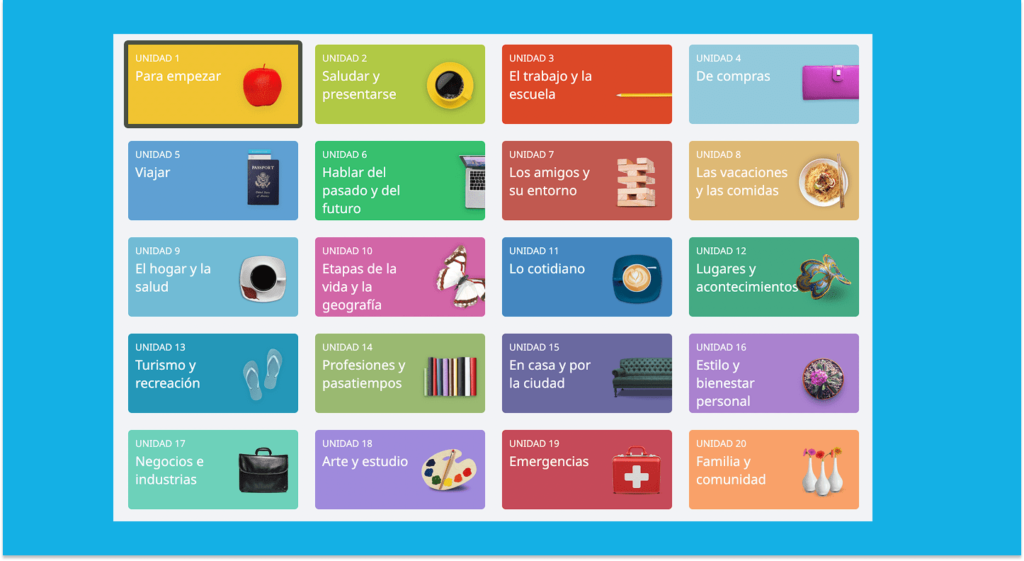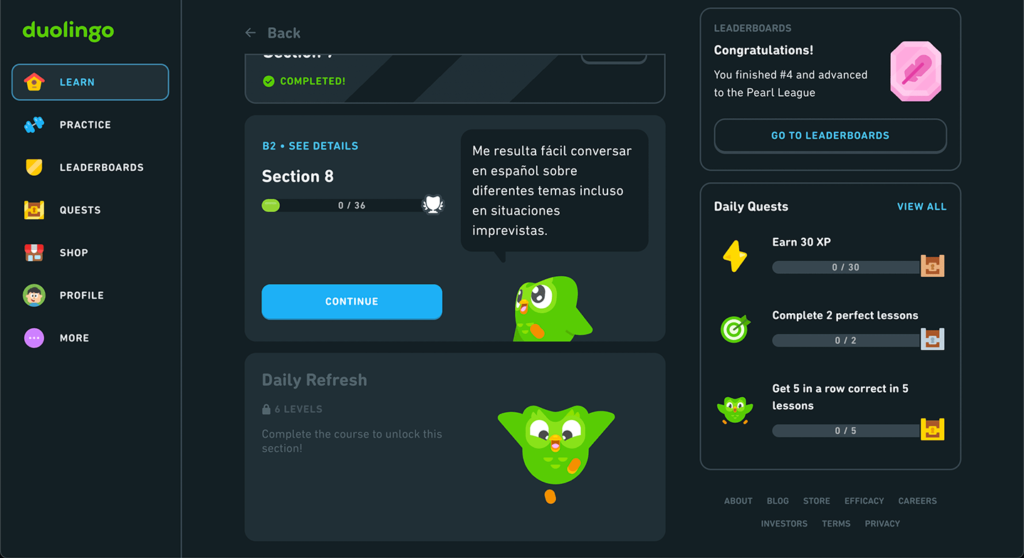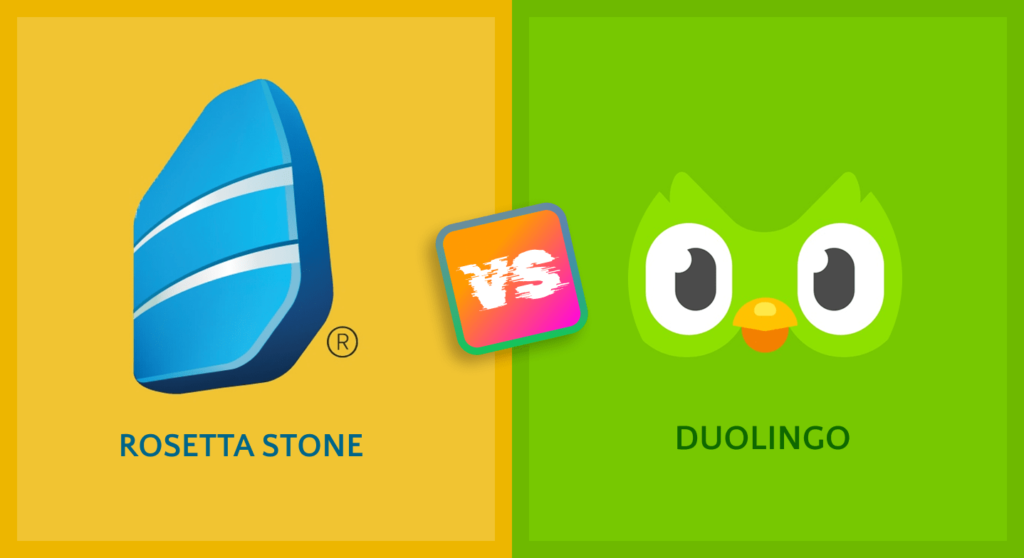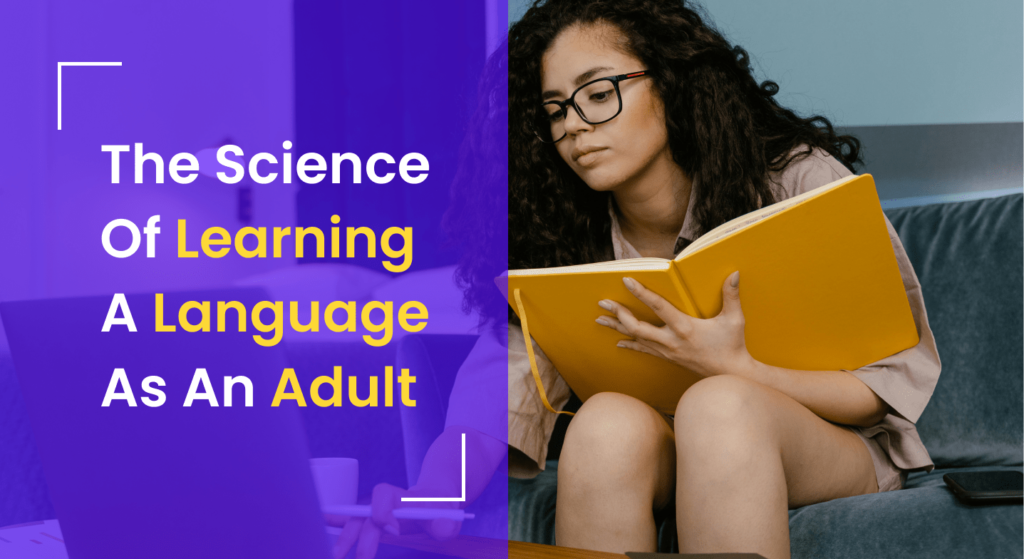Which is Better: Rosetta Stone vs Duolingo
Both apps have very different teaching styles—so the better one really depends on how you prefer to learn.
Rosetta Stone is based on learning through immersion, the idea is that you can absorb the language the same way you did as a child—by seeing, hearing, and repeating, without relying on grammar rules or translations. That’s why it puts a strong focus on pronunciation and repetition. If you want to learn a language in a more relaxed, no-pressure environment without too much explanation, then Rosetta Stone can be a good fit for you.
👉 Try Rosetta Stone (Free Trial)
Want to see how Rosetta Stone’s immersion method works? Start your free trial here and explore the lessons risk-free.
Duolingo, on the other hand, focuses on making learning fun and easy to stick with. It’s gamified, casual, and full of mini-rewards that make it easier to build a daily habit. You still get some grammar and vocabulary practice, and even speaking tools if you upgrade—but the real strength is how it keeps you coming back. If you’re learning a language purely for fun, then Duolingo is your solid option.
👉 Try Duolingo (Free Plan Available)
You can use Duolingo completely free. Start learning here and see if their gamified style keeps you coming back.
My Personal Take
Rosetta Stone’s immersion method might work for some, but in my opinion, it’s better suited for younger learners. If you’re an adult (25 and up), you can’t just expect to “absorb” the language naturally—your brain doesn´t function like that anymore.
👉 Curious why adults can’t just “absorb” a new language like kids do? Here’s how the adult brain really learns languages.
As an adult, learning a new language takes focus, grammar, and practice. You have to put in more effort. After using Rosetta Stone, I was able to pick up some vocabulary and phrases, but I´m still really struggling to express myself. The whole immersion method it promises just didn’t work on me.
Duolingo, on the other hand, was actually enjoyable. It kept me consistent, and I even completed a 365-day streak. It was the first app I used to learn Spanish, and I used it intensely before moving to Madrid. I was able to learn basic phrases and how to conjugate simple verbs—but once I got here, I realized I still couldn’t understand the locals or speak Spanish beyond the usual “hola,” “buenos días,” “sí,” “está bien,” and “gracias.” In the end, it felt more like a game than a lesson.
Right now, I’ve stopped using both and switched to an app that has made a real difference for me: Babbel. It even helped me pass my A2 DELE exam and now I’m preparing for B1.
👉 Check out my full Babbel review here. Or even better—try Babbel for free for 7 days and see if it fits your learning style.
What Should You Want From a Language App?
When I moved to Madrid back in 2022, I couldn’t speak a single word in Spanish—aside from the usual “sí,” “hola,” and “gracias.” And that’s despite the fact that I had already spent a whole year before that trying to learn Spanish. I dedicated my time and effort into Spanish because I wanted to be “Spanish-ready” by the time I arrive.
So I tried a bunch of apps to improve my Spanish. Some helped a bit, but a lot of them just left me frustrated. Up until now, I’m still learning Spanish every single day—nonstop. And at this point, I can confidently tell you which apps are actually worth your time. Because not all language learning apps are built the same.
Some apps will keep you busy and make you feel like you’re making progress, but in the end, they’ll leave you stuck and nowhere near your language goals. If you’re like me—someone who just moved (or is planning to move) to a new city and can’t speak the local language yet—then you should look for these features too.
Rosetta Stone
I actually had high expectations for Rosetta Stone because it’s such a well-known language learning platform. But when I used it to learn Spanish, I ran into odd sentences like “This panda is from China, but he does not speak Chinese.” I mean, when am I ever going to say that? Sure, the grammar is correct, but for someone like me trying to learn a new language, I’d rather focus on things I’d actually say in real life.
Duolingo
Duolingo is known for its quirky sentences… and not in a good way. “The bear drinks beer”? “I am not your horse”? It was amusing at first, but it grew old when I realized these weren’t helping me order food, ask for directions, or survive in a basic conversation. Some phrases are nice, but some just make you scratch your head.
Winner: Neither app wins this round for me
2. Do you want to actually remember what you learned a week, a month, or a year from now?Rosetta Stone
Once you finish a lesson from Rosetta Stone, there’s not much push to review it later. It doesn’t have a system that would remind you to come back and refresh your memory—and that’s a huge missed opportunity if you want those vocabs and phrases to stick long-term.
Duolingo
Duolingo now has its spaced repetition system (SRS) built into the app. Words and phrases that you haven’t practiced in a while will show up again just before you start to forget them. In theory, it tracks your vocabulary strength behind the scenes and gives you gentle nudges to practice what you’re starting to forget.
Winner: Duolingo
3. Do you want a bit of grammar support, just enough to help you pick up language patterns?Rosetta Stone
Another letdown from Rosetta Stone for me is that it doesn’t explain grammar—at all. When I make a mistake, it just tells me it’s wrong. That’s it. No feedback, no clue what rule I broke, and no way to figure it out unless I go Googling on my own. The method is supposed to help you intuitively learn grammar through repeated exposure, but in reality, it´s just left me confused, especially when the difference between my answer and the correct one is super subtle.
Duolingo
Duolingo sometimes gives a short explanation when you make a mistake, but I find it vague or incomplete. That’s why the Duolingo forums exist—so users can ask, “Why was my answer marked wrong?” and hope another user can explain. The grammar support isn’t totally absent, but for me it isn´t enough.
Winner: Duolingo (barely)
I’ll give it to Duolingo this round, but its grammar explanations aren’t much of a help. It’s slightly better than nothing—but if you’re serious about understanding grammar, you’ll need to look outside the app.
Rosetta Stone
Rosetta Stone focuses heavily on repetition and pronunciation. You’ll spend a lot of time listening and repeating phrases back to the app. It has its own speech recognition tool to check whether you’re saying things correctly. That said, the speaking practice is more about parroting than actually using the language. Basically, you’ll not be taught how to make conversations; you’ll just repeat what you hear. It’s helpful if you are a beginner to practice your pronunciation though.
Duolingo
Duolingo also has speaking exercises, but it´s just like Rosetta Stone´s. You´ll just read a sentence out loud or repeat a phrase, and it´s not interactive either. So, unless you upgrade to Duolingo Max, there’s not much real speaking practice.
Now, if you do get Duolingo Max, you unlock a feature called AI-powered conversations. These are short, scenario-based dialogues designed to simulate real-life situations— like checking into a hotel or greeting your neighbor. You type or speak your responses, and the AI responds like a conversation partner. It’s meant to help you practice using the language more freely, not just repeating set phrases.
Winner: Duolingo Max
5. Do you want a clear learning path that shows real progress, not just random lessons with no direction?Rosetta Stone
Rosetta Stone follows the CEFR framework (A1 to C1), and it does it well I might say. Each level is divided into units like “Work and School,” “Shopping,” or “Past and Future,” based on what a learner at that level should be able to talk about. It feels like you’re following a real course—with goals that match your level. The structure is clear, and everything builds logically from one unit to the next. To me this is Rosetta Stone’s biggest strength.
Rosetta Stone
Duolingo also follows the CEFR framework, but it feels more “flexible”—or maybe looser is a better word. So you get a guided path, and there are checkpoints that show how far you’ve come. But sometimes, even as I advance, the lessons don’t feel much harder. I´m still being served bite-sized drills that feel more entertaining than educational. I feel like Duolingo only keeps me busy, but it is not pushing me hard enough to learn.
Winner: Rosetta Stone
6. Do you need motivation to stay consistent, even on the days you don’t feel like studying?Rosetta Stone
Rosetta Stone keeps things pretty serious, and you’ll immediately feel that it’s not “gamified”. There are no challenges, no daily streaks, no leaderboards, or anything like that. It’s just you and the lessons. If you’re self-motivated, then you don’t need any of that. But if you’re someone who needs a bit of encouragement to stay on track (like me), Rosetta Stone won’t do much to help you build a habit—you’ll need to figure that part out yourself.
Duolingo
This is Duolingo’s strength. The app is designed to keep you coming back—daily streaks, XP points, leaderboards, badges, reminders, and even cute animations when you complete a lesson. It turns language learning into a game. No wonder it’s become the most popular language learning app out there. I myself completed a 365-day streak—that’s how entertaining and addictive Duolingo can be. It might not always feel “serious,” but if your biggest challenge is staying consistent, this app knows how to keep you showing up.
Winner: Duolingo
Special Features
Rosetta Stone´s Special Features
👉 Want a deeper dive? Read my full Rosetta Stone review here.
- Speech Recognition – You repeat phrases and get feedback on your pronunciation.
- Audio Companion – Lets you review lessons hands-free. Good for practicing while walking or commuting.
- Phrasebook – A collection of practical phrases sorted by themes like travel, emergencies, or dining out. Great for quick reference, especially before a trip.
- Stories – Short reading passages where you listen, follow along, and even record yourself reading out loud.
- Extended Practice – Extra drills on pronunciation, listening, and reading that reinforce what you just learned.
- Offline Mode – You can download lessons and keep practicing without Wi-Fi, which is a plus if you’re on the go.
Duolingo´s Special Features
👉 Want more info? Check out my complete Duolingo review here.
- Skill-Focused Practice – You can practice specific skills like speaking full sentences, listening to audio clips, or reviewing words you’ve already learned.
- Mistake Tracking – The app remembers your mistakes and brings them back later, so you get more chances to practice and actually improve.
- Stories – Short, simple dialogues (in some languages) that help you with everyday conversations without making it feel like a grammar class.
- Leaderboards & Friends – Competing for XP and seeing where you rank keeps things motivating, especially on slow days. Adding friends adds a bit of fun pressure too.
- Quests – Daily and weekly goals that give you small wins and keep things from getting boring.
- Podcasts – Available in Spanish and French, these bilingual episodes help improve listening and reading. The storytelling format makes them easy to follow.
- Duolingo Max (Paid Version) – You get Explain My Answer, which basically provides an answer when you get it wrong, and AI Conversations, where you can practice speaking in short scenarios. It’s a cool idea, but the responses still feel a little awkward. Honestly, for the price, it’s hit-or-miss—but worth a try if you’re curious.
Comparison Table: Rosetta Stone VS Duolingo
|
What You Should Consider |
Rosetta Stone |
Duolingo |
|---|---|---|
|
Real-Life Phrases You’ll Actually Use |
Correct grammar, but weird, impractical phrases like “This panda does not speak Chinese.” |
Quirky and unnatural sentences. |
|
Helps You Remember What You Learn (SRS) |
No spaced repetition. |
Built-in spaced repetition. Tracks your weak words and brings them back for review. |
|
Easy Grammar Explanations & Drills |
No explanations—just tells you you’re wrong. |
Occasionally explains why you’re wrong, but often vague. Slightly more helpful than Rosetta. |
|
Speaking Practice That Feels Useful |
Lots of repetition and pronunciation practice, but not real conversation. |
Basic speaking drills unless you upgrade to Max. AI conversations are promising but still clunky. |
|
Clear Path With CEFR Structure |
Follows CEFR. Structured levels with topics matched to what learners should know. |
Follows CEFR loosely. Feels like progress, but lessons often feel repetitive or random. |
|
Motivates You to Stay Consistent |
No gamification or rewards. You have to motivate yourself. |
Gamified with streaks, leaderboards, quests, and XP. Makes you want to keep coming back. |
|
Bonus Features You’ll Actually Use |
Phrasebook, Audio Companion, Stories, Extended Practice, Offline Mode. |
Skill practice, Stories, Mistake Tracking, Leaderboards, Quests, Friends, Podcasts, AI tools. |
|
Pricing |
€19.95/month (3-month plan: €59.85 total) |
Free with ads; Duolingo Max is €40.00/month |



